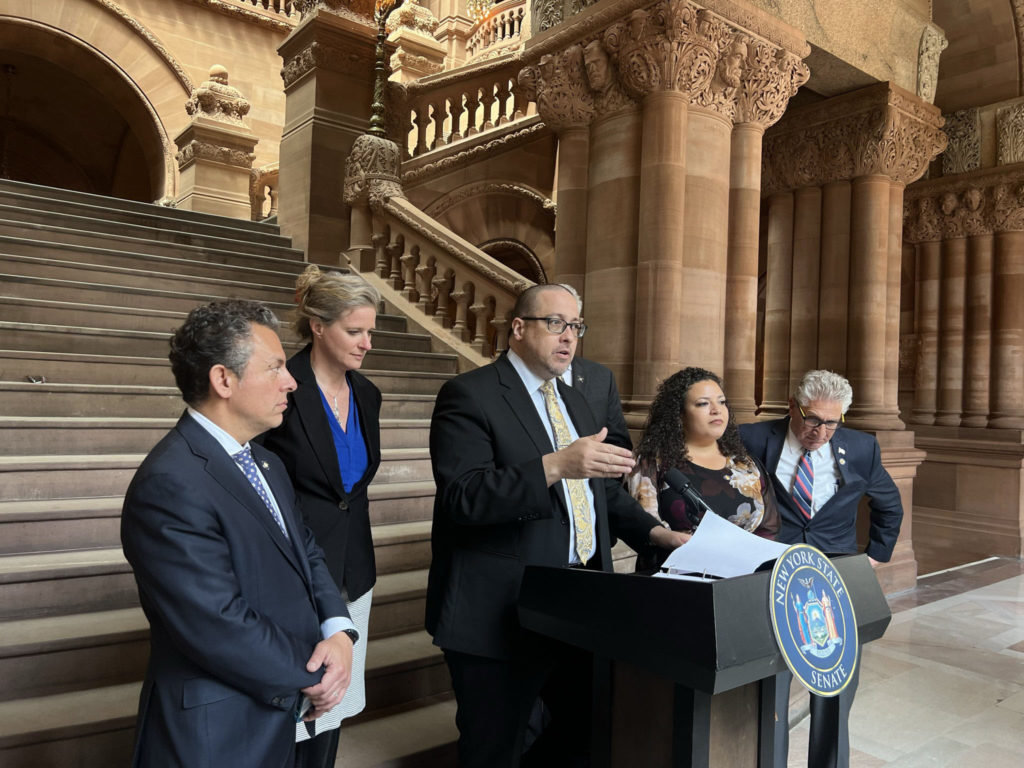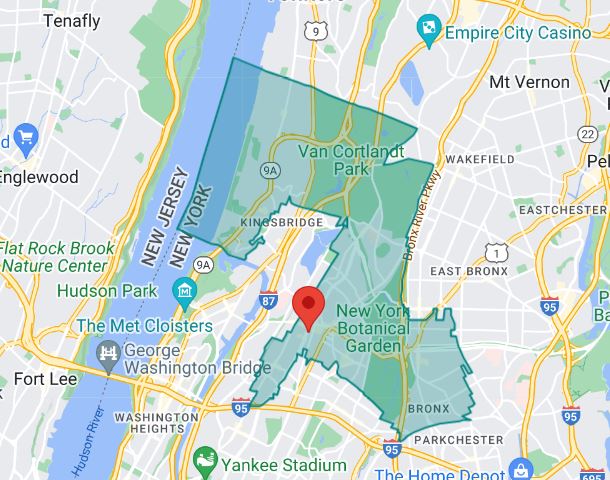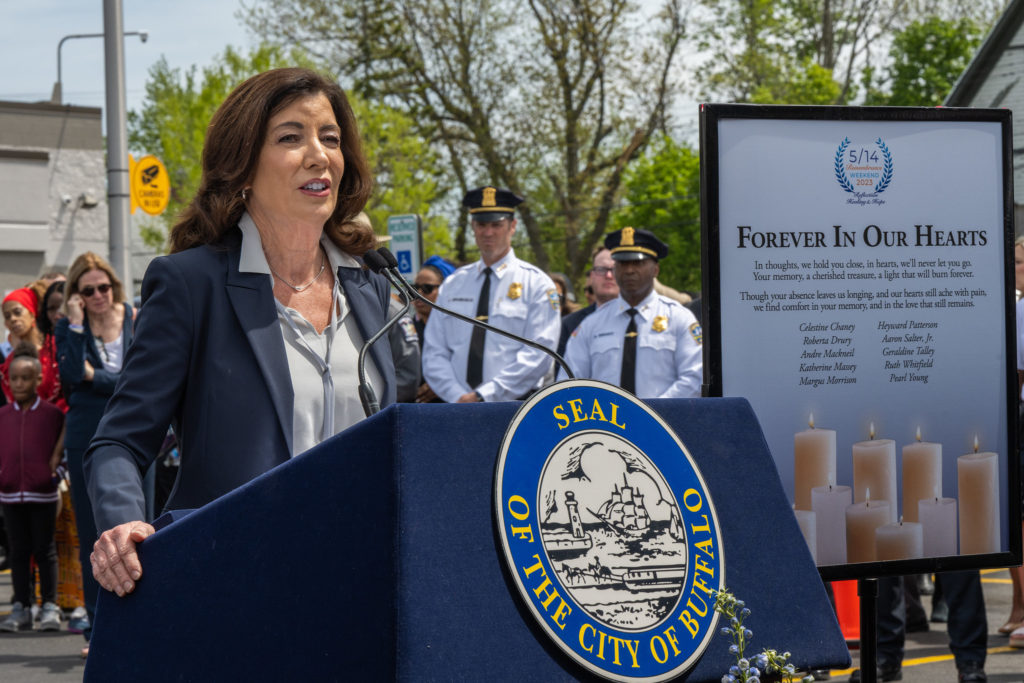
Photo courtesy of the Office of State Sen Gustavo Rivera
State Sen. Gustavo Rivera (S.D. 33) joined his colleagues in the senate majority to vote for the 10 bills approving the 2023-2024 New York State Budget of $229 billion before Gov. Kathy Hochul finally signed the overdue budget into law on May 3. Rivera, who represents much of the northwest Bronx including Norwood, voted in favor of all bills, which covered the following areas: aid to localities; debt service; revenue; capital projects; State operations; legislature and judiciary; transportation; economic development and environmental conservation (TEDE); public protection and general government (PPGG); education, labor, and family assistance (ELFA); and health and mental hygiene (HMH).
“This budget represents the best agreement we could get due to the governor’s intransigence,” Rivera said. “Unfortunately, this is a budget of lost opportunities. I am very grateful to Majority Leader Stewart-Cousins and our entire Democratic Conference for fighting to reduce the harm that many of the executive proposals would have caused. In the short time that we have left this session, I know that our conference will focus on addressing the concerns of working-class New Yorkers that were not addressed by the governor’s misguided priorities.”
Rivera alleges that instead of directly addressing what he said was the severe affordability crisis facing millions of New Yorkers, the governor prioritized proposals that serve wealthy and powerful interests. “Housing costs are the driving factor in the rising cost of living across our state, so we must take action to create an affordable housing market where homeownership is accessible and renters have stability,” he said. “Yet, Good Cause Eviction was discarded, the minimum wage increase proposal needed by so many was watered down, and the resounding call to tax billionaires and corporations went ignored.”
The senator said that holding the line on the issues that New Yorkers care the most about does not end with the recently adopted budget. “The Bronx sent me to Albany to advance policies that will keep them in affordable homes, provide services that make our communities safer, and ensure healthcare and stability for every New Yorker.” He vowed to remain “relentless” in fighting for proven solutions and governing in the interest of his neighbors and community.”
Senate District 33
The senator provided the following highlights in terms of funding for Senate District 33, which includes some or all of the Bronx neighborhoods of Norwood, Bedford Park, Fordham Heights, Fieldston, Kingsbridge, Kingsbridge Heights, Jerome Park, Fordham Manor, Van Cortlandt Village, Belmont, Riverdale, North Riverdale, Spuyten Duyvil, Pelham Parkway, Van Nest, Morris Park, Morris Heights and Mt. Hope.
“This budget allocates funding for many local initiatives and organizations serving my Bronx constituents, including gun violence prevention programs, legal services for vulnerable communities, and landmark cultural institutions,” Rivera said.
According to the senator, district funding highlights include:
- $135,000 for Housing Court Answers
- $290,000 for Mobilization for Justice
- $250,000 for Bronx Legal Services
- $15 million in additional funding for legal representation for tenants for a total of $50 million.
- $140,000 for the Hope Program (Sustainable South Bronx).
- $140,000 for Kingsbridge Riverdale Van Cortland Development Corporation.
- Increases $20 million for institutions including the New York Botanical Garden and Bronx Zoo.
- $1.5 million for additional gun violence prevention grants.
- Re-appropriates $100.5 million exclusively for the development of the Kingsbridge Armory.
Health
Rivera, who heads up the health committee in Albany, said that after a decade of austerity in the health budget, the government could and should have done more to ensure the long-term financial stability of struggling healthcare institutions, particularly safety net hospitals and community-based health centers. “This budget does begin to address the needs of struggling healthcare institutions by implementing historic Medicaid reimbursement rate increases for hospitals, nursing homes, and assisted living facilities, but we must do more,” he said.
The senator said that another positive development was that amidst a maternal mortality emergency, he was thrilled that the government will provide Medicaid coverage for doulas, who he said make an undeniable impact in keeping pregnant New Yorkers healthy through birth, before adding that the failings of the health part of the budget were largely in what was not included.
“It is as confounding as it is upsetting that my Coverage for All proposal was excluded,” he said. “New York would have saved $400 million by offering health coverage to 240,000 New Yorkers for essential care instead of being forced to depend solely on emergency care. The administration’s decision not to seek federal funds to cover this population is not only devastating for immigrant New Yorkers, but fiscally irresponsible.” Norwood News previously reported on this point further to a rally which was held in Norwood while the budget negotiations were ongoing.
Rivera continued, “I am dismayed that the governor decided to move forward with the pharmacy carve out and refused to explore my proposed compromise bill that would have safeguarded our 340B safety-net providers and their vulnerable patients, protected pharmacies financially, and regulated Pharmacy Benefit Managers (PBMs).” He added, “Additionally, the governor failed to take the actions necessary to address operational concerns connected to her 340B plan which has already led to reduced healthcare services in our communities.”
The senator said he found it particularly distressing that the governor “flagrantly” disregarded recommendations by the Opioid Settlement Fund (OSF) Board, by choosing to solely direct money to Office of Addiction Services and Supports, rather than the Department of Health, the agency that oversees successful harm reduction and public health programs for people who use drugs. “If the governor is serious about ending an overdose epidemic that is deadlier than ever, she will work with us to direct settlement funds to proven harm reduction programs in the neighborhoods that need them.”
Norwood News previously reported on the senator’s stance on the topic of addiction during a Harm Reduction Forum held at Monroe College.

Map courtesy of The Office of State Sen. Gustavo Rivera via Google Maps
Education & Bail Reform
On education, part of the budget, along with bail reform, which Rivera described as “The Big Ugly,” the senator went on to say that he and others had pushed back against what he called the governor’s “outlandish” proposal to eliminate the cap on New York City charter schools, and allow the reauthorization of only 14 zombie charters. “I’m proud that we worked to maintain Foundation Aid funding for our public schools, and won millions for school meals and capital funding for libraries,” he said.
According to the governor’s office, Foundation Aid was created in 2007, and takes school district wealth and student need into account to create an equitable distribution of state funding to schools. However, the program has never been fully funded by the State and litigation over this lack of funding has been ongoing since 2014.
The latest legal settlement on the topic requires the State to phase-in full funding of Foundation Aid by the Financial Year 2024 budget, and this commitment has since been enshrined into State law. Below is a breakdown of currently anticipated Foundation Aid funding:
- Financial Year 2022: $19.8 billion, covering 30 percent of the existing shortfall
- Financial Year 2023: Approximately $21.3 billion, covering 50 percent of the anticipated shortfall
- Financial Year 2024: Approximately $23.2 billion, eliminating the anticipated shortfall, and funding the full amount of Foundation Aid for all school districts
State law requires school districts receiving a Foundation Aid increase of more than 10 percent or $10,000,000 to create plans on how these funds will be used to address student performance and need. School districts were required to submit their 2022-23 school year plans by July 1, 2022. During last year’s State assembly elections, candidate Phyllis “Tiz” Nastasio, a Catholic school teacher, alleged that funding for public schools was not going to the students’ benefit.
“I don’t think we need to put more money into it [the public school system],” she said at the time. “I think we need to know where the money that’s there is going, because it’s not going to the kids. It’s not going to the classrooms. So, I think we need to audit.” We asked if public records were not already available in this regard. “Not really,” she said. “They say how much each individual school is getting, but it’s not broken down. In my opinion, I think we have too much going into administration, and not enough going into the classrooms. I mean, we don’t need five assistant principals in every school.”
Meanwhile, Rivera said of the education funding, “We must continue to push back on the executive’s attempts to run two education systems [public schools and charter schools] instead of investing in the quality public system that most families rely on. As reported, the expansion of charter schools has long been a contentious issue.
Rivera went on to say that it was short-sighted, but not surprising, that the governor made another attempt to reform bail laws to “further criminalize poverty” instead of focusing on the services and economic justice he said were needed for safer communities. “As leaders, we should focus on living wages, affordable housing, healthcare, and violence intervention programs that prevent crime, as opposed to relenting to fearmongering and misinformation,” he said.
Environmental Justice
On the environment, the senator said the New York State Climate Justice Working Group recently finalized criteria for disadvantaged communities that he said will be the first to benefit from what was described as a historic Climate Leadership and Community Protection Act (CLCPA). “Almost every community I represent in The Bronx meets this criteria,” he said. “That’s why I fight for policies and programs that support a green economy and combat the health inequities exacerbated by environmental injustice.”
He went on to say that the budget included bold policies to combat climate change, address environmental justice, and reduce emissions. “We won major concessions to include the Build Public Renewables Act with real teeth and advance the All-Electric Buildings Act, creating historic pathways for our state to meet the CLCPA goals of zero-emission electricity while ensuring that labor and environmental justice communities have a seat at the table.”
Rivera said legislators will also enact a cap-and-invest program that “will take emitters to task.” He said he was proud to be part of a senate majority that was committed to implementing policies that will set an example for the nation on investing in clean, sustainable energy infrastructure.
Norwood News contacted the governor’s office for comment on the senator’s various statements on the budget. We were referred to previous remarks Hochul gave when she announced the budget agreement, and in particular, the following extract: “I laid out a bold vision, a way to make New York safer, more affordable, and more livable. It’s what I call the New York Dream, and sadly, this dream has been elusive for too many New Yorkers.”
The governor continued, “That’s why this is an historic day for the great State of New York, because we take one step closer to helping millions of New Yorkers achieve that dream of better, more inclusive opportunities for people, making people feel safer when they walk down the streets, where they can find opportunity and success for themselves and their families. That’s what this budget is all about.”

Photo courtesy of Darren McGee/The Office of Goveronor Kathy Hochul
On health care, Hochul said in part that the enacted budget provides an additional $22 billion multi-year investment to support the State’s health care system, including an additional $1 billion in health care capital funding for providers, and expanded Medicaid benefits for more than 7.8 million low-income New Yorkers.
“Through New York’s nation-leading health care system, we continue the important work of eliminating disparities and ensuring everyone in our state has access to the best care available,” she said. “These initiatives will improve the quality of our health care system, make access to care more equitable, and ensure we are well-prepared to address the future health care needs throughout New York State.”
On climate and energy, the governor announced investments in sustainable buildings, energy affordability, and clean energy development in what she said was one of the most extensive climate packages in recent history. She added that the budget makes transformative investments and includes groundbreaking legislation building on more than $30 billion committed to climate action.
“New York is committed to building a clean economy and protecting our environment for future generations,” Hochul said. “This budget shows an unprecedented commitment to green infrastructure, reducing emissions from the building sector, and protecting clean water. I thank my colleagues in the legislature for their collaboration on a transformational budget that represents one of the most ambitious packages our state has advanced as we continue the fight against climate change.”
On public education, Hochul described the budget again as historic, saying it includes a record $34.5 billion in total School Aid for school year 2024. School Aid increases by $3 billion the highest level of State Aid and fully funding Foundation Aid, the governor said. A further $150 million increase has been allotted to prekindergarten and $134 million to expanded access to free school meals.
The budget also authorizes the expansion of “educational opportunities with 22 additional charter schools,” Hochul said and there are also what were described as historic investments in SUNY’s transformation and CUNY’s strategic needs and $2.4 billion in new capital for SUNY and CUNY, the largest investment in 15 years. Additionally, there is also $381 million allocated to new operating support for SUNY and CUNY, and a $500 million State matching fund for SUNY endowment contributions, according to the governor.
“All New Yorkers deserve access to a high-quality education, from prekindergarten through their college graduation,” Hochul said. “Thanks to the help of Majority Leader Stewart-Cousins and Speaker Heastie, this unprecedented level of transformational investments will open new doors for more students to build a brighter future for themselves and gain the skills needed for the jobs of the future.”
On public safety, Hochul said the budget improves public safety by providing judges greater discretion to set bail for serious crimes, providing $170 million to support the implementation of discovery reform for prosecutors and defenders, and investing $347 million in evidence-based gun violence prevention initiatives.
The topic of funding for discovery reform had been highlighted by Bronx District Attorney Darcel Clark during our recent profile of the district attorney. Hochul was joined by New York City Mayor Eric Adams, district attorneys and other leaders in public safety and criminal justice during her budget announcement. Additional highlights include what were described as transformative investments to reduce recidivism, addressing the flow of “deadly” fentanyl into New York State, and improving Statewide emergency response services.

Photo by Síle Moloney
“Public safety is my top priority, and I’m proud that this budget delivers record investments and critical improvements to the justice system to make New Yorkers safer,” Hochul said. “By ensuring judges have the discretion they need, investing in proven strategies to combat gun violence, and strengthening criminal justice reforms, we are using every tool at our disposal to improve safety in every community across the State.”
Rivera joined State Sen. Nathalia Fernandez (S.D. 34) on the steps of the State Capitol in Albany on May 9, to support the new senator’s “Protect the People’s Budget Act,” a bill which Rivera said aims to restore checks and balances between the executive and legislative branches of State government when negotiating the State budget to ensure elected officials legislate properly on behalf of New Yorkers.
Fernandez represents parts of Westchester as well as the East Bronx, including some or part of the neighborhoods of Pelham Bay, Morris Park, Orchard Beach, Parkchester, Soundview, Throggs Neck, Castle Hill and Clason Point. “This bill will restore the checks and balances between the executive and legislative branches when negotiating the state budget and ensure we legislate properly on behalf of New Yorkers,” Rivera said.




